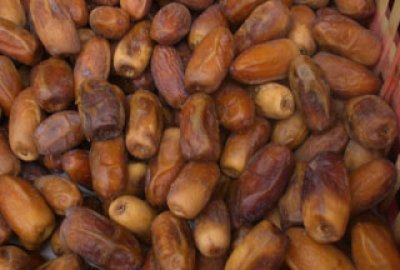Dates

They are the fruits grow on the palm tree belonging to the family of Arecaceae in the genus: Phoenix and scientifically named as Phoenix dactylifera. The tree is believed to originate in the lands on the banks of Nile and Euphrates Rivers of ancient Egypt and Mesopotamia. Date palm is now grown extensively for its edible fruits under warmer climates across all the continents.
Wonderfully delicious, dates are one of the most popular fruits packed with an impressive list of essential nutrients, vitamins, and minerals that are required for normal growth, development and overall well-being.
Fresh dates compose of soft, easily digestible flesh and simple sugars like fructose and dextrose. When eaten, they replenish energy and revitalize the body instantly. For these qualities, they are being used to break the fast during Ramadan month since ancient times.
The fruit is rich in dietary fiber, which prevents LDL cholesterol absorption in the gut. Additionally, the fiber works as a bulk laxative. It, thus, helps to protect the colon mucous membrane by decreasing exposure time and as well as binding to cancer-causing chemicals in the colon.
They contain health benefiting flavonoid polyphenolic antioxidants known as tannins. Tannins are known to possess anti-infective, anti-inflammatory, and anti-hemorrhagic (prevent easy bleeding tendencies) properties.
They are moderate sources of vitamin-A, which is known to have antioxidant properties and essential for vision. Additionally, it is also required maintaining healthy mucus membranes and skin.
They compose antioxidant flavonoids such as ß-carotene, lutein, and zea-xanthin. These antioxidants found to have the ability to protect cells and other structures in the body from harmful effects of oxygen-free radicals. Thus, eating dates found to offer some protection from colon, prostate, breast, endometrial, lung, and pancreatic cancers.
Dates are an excellent source of iron, contains 0.90 mg/100 g of fruits (about 11% of RDI). Iron, being a component of hemoglobin inside the red blood cells, determines the oxygen-carrying capacity of the blood.
Further, they are very good in potassium. Potassium is an important component of cell and body fluids that help controlling heart rate and blood pressure. They, thus, offers protection against stroke and coronary heart diseases.
They are also rich in minerals like calcium, manganese, copper, and magnesium. Further, the fruit has adequate levels of B-complex group of vitamins as well as vitamin K. It contains very good amounts of pyridoxine, niacin, pantothenic acid, and riboflavin. These vitamins are acting as cofactors help body metabolize carbohydrates, protein, and fats. Vitamin K is essential for many coagulant factors in the blood as well as in bone metabolism.